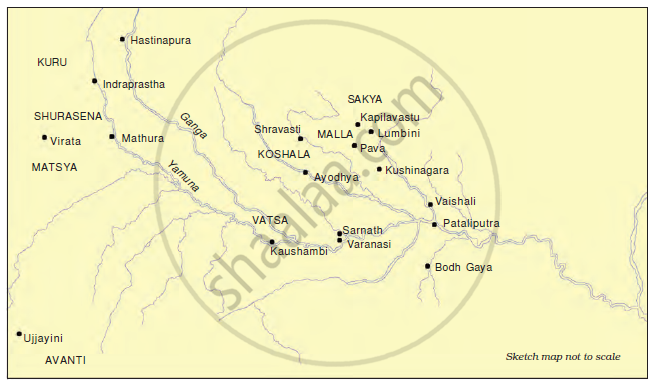Advertisements
Advertisements
Mention any two sources to know about Bhakti and Sufi traditions from eighth century to eighteenth century.
Concept: undefined > undefined
Highlight the contribution of Krishnadeva Raya in the expansion of Vijaynagar Empire.
Concept: undefined > undefined
Advertisements
With the help of specific examples examine the nature of Indian leadership that emerged against the British in the revolt of 1857.
Concept: undefined > undefined
Read of the following passage and answer the question that follows:-
'Arya Samaj, A North Indian Hindu reform organisation of the late nineteenth and early twentieth centuries, particularly active in Punjab (tried to bring back Hindus who had converted to some other religion) which sought to revive Vedic learning and combine it with modern education in the sciences'.
a. Illustrate how the values integrated with the rich Indian literature paved way for the scientific development of modem India
Concept: undefined > undefined
“Analyse the role of Zamindars during the Mughal period.
Concept: undefined > undefined
Examine how were the lives of forest dwellers transformed in the sixteenth and seventeenth centuries.
Concept: undefined > undefined
State any three features of Mahajanpadas. How did Magadha become the powerful Mahajanpada ? Explain.
Concept: undefined > undefined
1. On the given political outline map of India (on Page 15), locate and label the following with appropriate symbols:-
- The place where Gandhiji called off Non Cooperation Movement.
- Agra, the imperial capital of Mughal.
2. On the same outline map of India, three paces related to the mature Harappa sites have been market as A, B and C. Identify them and write their correct names on the lines drawn near them.

Concept: undefined > undefined
The Lingayats disapproved certain practices of the Dharmashashtras. City any two such practices.
Concept: undefined > undefined
Why were the water resources of the Vijayanagara Empire developed? Give reasons.
Concept: undefined > undefined
Critically examine Lord Dalhousie's policy of annexation in Awadh.
Concept: undefined > undefined
How did Sutta-Pitaka reconstruct the philosophy of Buddhism? Mention about Buddhist Tipitaka.
Concept: undefined > undefined
On the given political outline map of India (on Page 11), locate and label the following with appropriate symbols:
(a) Dholavira
(b) Agra-the capital city of Mughals

Concept: undefined > undefined
On the same outline map of India, three centres related to the Revolt of 1857 have been marked as A, B and C. Identify them and write their correct names on the lines drawn near them.

Concept: undefined > undefined
Answer in 100-150 words
List the items of food available to people in Harappan cities. Identify the groups who would have provided these.
Concept: undefined > undefined
Answer in 100-150 words
How do archaeologists trace socio-economic differences in Harappan society? What are the differences that they notice?
Concept: undefined > undefined
Map work
On the given map, use a pencil to circle the sites where evidence of agriculture has been recovered. Mark an X against sites where there is evidence of craft production and R against sites where raw materials were found.

Concept: undefined > undefined
Answer in 100-150 words
The following is an excerpt from the Mahabharata in which Yudhisthira, the eldest Jandava, speaks to Sanjaya, a messenger:
Sanjaya, convey my respectful greetings to all the Brahmanas and the chief priest of the house of Dhritarashtra. I bow respectfully to teacher Drona … I hold the feet of our preceptor Kripa … (and) the chief of the Kurus, the great Bhishma. I bow respectfully to the old king (Dhritarashtra). I greet and ask after the health of his son Duryodhana and his younger brother ... Also greet all the young Kuru warriors who are our brothers, sons and grandsons … Greet above all him, who is to us like father and mother, the wise Vidura (born of a slave woman) ... I bow to the elderly ladies who are known as our mothers. To those who are our wives you say this, “I hope they are well-protected”… Our daughters-inlaw born of good families and mothers of children greet on my behalf. Embrace for me those who are our daughters … The beautiful, fragrant, well-dressed courtesans of ours you should also greet. Greet the slave women and their children, greet the aged, the maimed (and) the helpless …
Try and identify the criteria used to make this list – in terms of age, gender, kinship ties. Are there any other criteria? For each category, explain why they are placed in a particular position in the list.
Concept: undefined > undefined
Write a short essay (about 500 words) on the following:
Discuss whether the Mahabharata could have been the work of a single author.
Concept: undefined > undefined
Map work
Compare the map in this chapter with Map 1 in Chapter 2. List the mahajanapadas and cities located near the Kuru-Panchala lands.
Map 1 of Chapter 2(Kings, Farmers and Towns)

Map 1 of Chapter 3(Kinship, Caste and Class)

Concept: undefined > undefined
